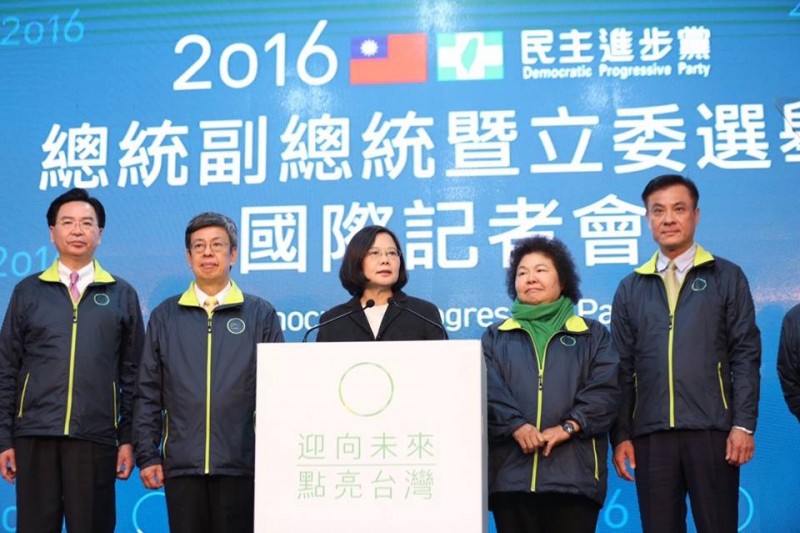
Taiwan's President-Elect Tsai Ing-wen speaking to foreign and domestic media at her campaign headquarters after her opponents conceded defeat. Photo from Tsai's Facebook page.
Taiwan has elected its first female president, Tsai Ing-wen, an opposition candidate from the Democratic Progressive Party (DPP). Tsai won 56.12 percent of the popular vote (6,897,744 ballots), soundly defeating Eric Chu from the Chinese Nationalist Party (KMT), who won 31 percent of the vote, and James Song of the People’s First Party (PFP), who won 13 percent.
Tsai, popularly known as “Little Ying” and “Xiao Ying,” also led her party to a majority in the legislature, taking 68 of the 113 seats up for grabs, handing the president-elect a considerable mandate for the next four years. Tsai is expected to focus on improving social security in a struggling economy that's facing rising unemployment, low salaries, and a rising cost of living.
Facebook user Chen Fang-yu summarized what many were feeling, following the election:
關於選舉的幾點感想:
1、政黨輪替是民主政治的常態,其目的不是在選出一個最好最「英明」的領導人,而是在告訴執政者:你做不好的話,就會被換掉。2、這是我國立法院史上第一次的政黨輪替,先前泛藍席次從來沒有低於五成過。從來沒有。
民進黨第一次完全執政,人民將權力託付給民進黨,接下來四年希望每位政治人物都不要忘記、不要辜負這個託付。人們會繼續大力監督的(大家平常要多關心政治呀!生活處處皆政治)台灣現在面對的內、外挑戰都相當大,必須認真地面對。
馬英九政府的失敗主因就是不願意傾聽人民的聲音,民進黨必須記取教訓。3、綠黨與社會民主黨還是無法通過門檻,實在可惜。
台灣需要真正意義的左派力量來制衡兩大黨都偏向右派的政策取向。
These are my election views:
1. Party alternation is a normal occurrence in a democratic political system, and the goal of elections is not to choose the wisest leader, but to tell the ruling party: “If you don’t perform well, you can be voted out.”
2. This is the first time party alternation has happened in my country’s legislature. Pan-blue [KMT and its affiliates] seats in the past never fell below 50 percent. For the first time in history, the DPP was entrusted by the people with a complete mandate. I hope, in the next four years, these politicians do not forget that their mandate comes from people, who will continue to monitor their performance. (Everyone please be more interested in politics! Every aspect of our lives involves politics!)
3. Taiwan faces many challenges—both domestic and international—and we must deal with that seriously. The failure of President Ma Ying-jeou's administration was the result of the government's failure to listen to people's voices, and the DPP must remember this lesson.
4. It is a pity that the Green Party and the Social Democratic Party were unable to to gain any legislative seats. Taiwan still needs meaningful left-leaning parties, in order to strike a balance against the two major parties’ right-leaning policies.
Tsai supporters shared their celebration online. Irene Chang joined the crowd at Tsai’s campaign headquarters and wrote “We've made it!” on her photo:
While the weather was good after a rainy week in some parts of Taiwan, voter turnout was the lowest recorded in all presidential elections, reaching just 66 percent (compared to 74 percent in the previous election in 2012). Absentee voting is not an option in Taiwan.
Some did return home to vote, such as the owner of this coffee shop in Chiayi County. He closed his business for the day, so he could return home to his registered voting precinct. The sign he posted on the shop's gate has gone viral online:
![The note on the gate said: Taiwan will not miss this cup of a drink, but [it] will miss this vote. Shop on Vacation. Returned Home to Vote. Photo from Facebook Noodles News.](https://globalvoices.org/wp-content/uploads/2016/01/noodles-news-450x600.jpg)
The note on the gate reads, “Taiwan won't miss a few cups of coffee, but it will miss this vote. This store is on vacation. I've gone home to Vote.” Photo from Facebook Noodles News.
Varsity, a magazine run by students from the Chinese University School of Journalism and Communication, also organized a team of reporters. They observed how the failure of the One Country and Two Systems in Hong Kong has helped DDP to gain voters’ support:
Banner outside DPP headquarters says step over the corpse of HK and stay away from China #TaiwanElection pic.twitter.com/tdrvosDPq4
— Varsity CUHK (@varsitycuhk) January 16, 2016
Lorand C. Laskai, a media observer, commented:
#TaiwanElection shows power of sustained civic activism. It's a rare brightspot for democracy in recent years. On China's doorstep, no less.
— Lorand C. Laskai (@lorandlaskai) January 16, 2016







